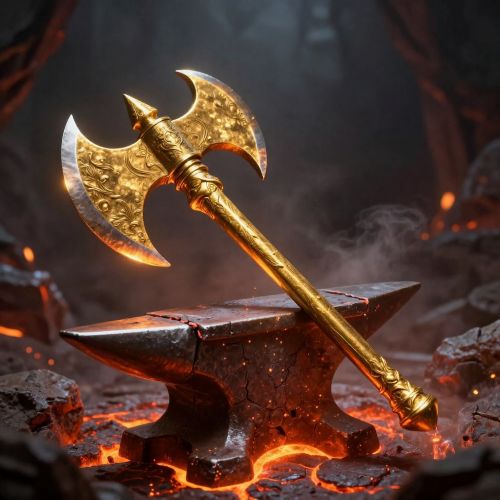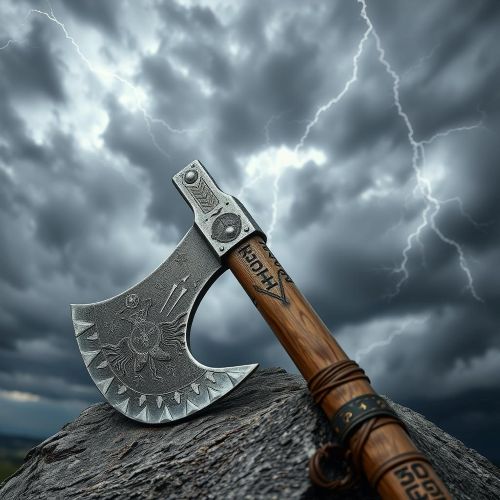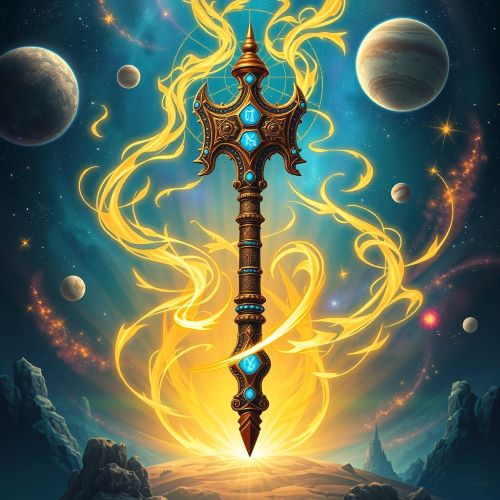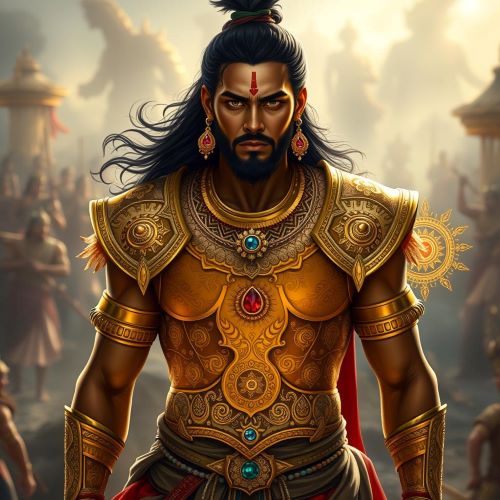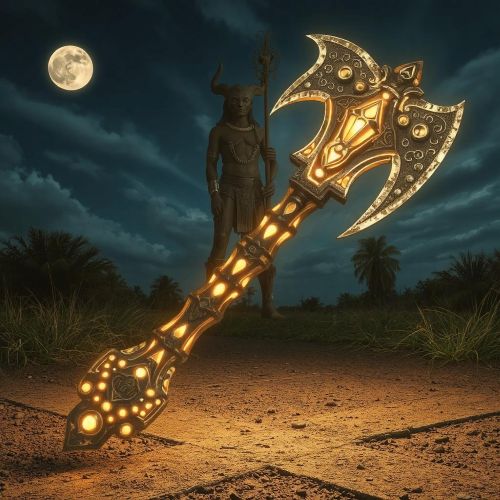
Axe of Legba : The Divine Communicator
Axe of Legba
Introduction
In the spiritual traditions of the Fon people of West Africa, the deity Legba holds a central and revered role. Known as the gatekeeper of the spirit world, he governs the crossroads—those mystical intersections where the divine and the mortal meet. Among the many sacred symbols and tools associated with Legba, one of the most fascinating is his axe. Unlike the more widely known weapons of thunder gods or warrior spirits, the Axe of Legba is subtle in its symbolism yet immense in spiritual significance. It is not merely an instrument of battle but a divine key—unlocking pathways, commanding energies, and asserting authority across realms. The axe represents Legba’s profound command over transition, duality, and sacred communication, all of which are foundational in Fon cosmology.
Origins
The origins of the Axe of Legba are closely linked to the mythic development of Legba himself, who emerged as a pivotal figure in the spiritual structure of the Fon people in what is now Benin. In their mythology, Legba serves as the divine messenger, the one who communicates the will of the gods and allows access to the spiritual world. His association with thresholds and crossroads isn’t merely symbolic—it reflects his power to connect contrasting forces: life and death, chaos and order, the sacred and the mundane.
According to oral traditions, the axe was not an ordinary weapon but was specially created by Gu, the celestial blacksmith deity who crafted tools and weapons for the gods. When Gu presented the axe to Legba, it was infused with cosmic energies that reflected Legba’s complex nature. It was said to channel his abilities to both build and break, opening up paths or closing them as he deemed necessary. The weapon, while crafted from physical materials, carried metaphysical properties that aligned with Legba’s role as a deity of passage, transformation, and enforcement of spiritual boundaries.
Think you know your myths and legends? Dive into the world of ancient stories and test your knowledge with our engaging quizzes on Mythlok!
Powers
The Axe of Legba does not function like a traditional weapon used in physical combat. Instead, its strength lies in its spiritual force. The axe embodies the dual nature of Legba—capable of connecting and dividing, healing and punishing, invoking spirits or banishing them. It is considered a powerful conduit for supernatural energy.
One of its most important abilities is opening and closing portals. In Fon belief, the boundaries between worlds are fluid, and the axe allows Legba—or those he empowers—to manipulate these invisible thresholds. It plays a vital role in rituals where communication with ancestors or deities is required, acting as the key to open divine gateways.Another distinctive attribute is its control over crossroads. These are not just physical locations but spiritual hubs where energies intersect. The axe channels Legba’s influence in these spaces, making it essential for ceremonies involving guidance, fate, and decision-making.
The axe also carries protective properties. It is believed to ward off malevolent spirits and ensure safety during rituals. In the hands of Legba or his devotees, it becomes an emblem of justice and moral equilibrium, used to mediate disputes and restore harmony. Lastly, the axe enhances Legba’s domain over language and speech. With it, he can speak all tongues, bridging communication gaps between people and the divine. This makes it indispensable in divination rituals where clarity and understanding are paramount.
Owners/Users
The Axe of Legba is first and foremost the possession of the deity himself. Depictions of Legba—whether in sculptures, shrines, or ritual art—often include the axe as one of his sacred tools, alongside other symbols such as keys or walking sticks. It underscores his authority over passage, protection, and divine speech.
However, in religious practice, symbolic versions of the axe are sometimes used by initiated priests and priestesses known as vodunsi. These individuals are trained spiritual intermediaries who serve as caretakers of Legba’s mysteries. Through rigorous initiation, they are granted the privilege of invoking Legba using ritual implements, including his axe.
These ceremonial axes are not mere decorations. Forged in iron and often inscribed with mystical symbols like eyes or serpents, they are spiritually activated through consecration rituals. The axe then becomes a sacred object, not to be used casually but only during significant ceremonies where Legba’s presence is invoked.
In diaspora communities, particularly in Haitian Vodou and New Orleans Voodoo traditions, Legba is syncretized with Saint Peter or known as Papa Legba. While the visual forms of the axe may vary, its spiritual function remains intact. Houngans and mambos—priests and priestesses—use representations of the axe during rituals that ask Legba to open the gates to the spirit world. It continues to serve as a token of access, influence, and divine authority.
Instances used
Though the Axe of Legba may not feature in tales of great wars or epic showdowns, it appears in narratives and rituals that are foundational to the Fon worldview. One widely shared legend recounts how the first sacred crossroad was created. Legba, summoned by the gods, used his axe to mark the ground at the spiritual intersection. That act transformed an ordinary space into a conduit between the worlds, sanctifying it for future rituals.
Another tale, known as the “Battle of the Silent Spirits,” tells of a time when human prayers went unanswered during a great drought. Spirits remained mute, ignoring the pleas of suffering villagers. In response, Legba struck the sky with his axe, breaking the silence and releasing divine rain and wisdom. It was not a battle in the traditional sense, but a moment of divine rebalancing through the symbolic power of the axe.
Today, the axe remains central in various rites. In initiation ceremonies, a ritual axe may be laid before the feet of a new initiate, representing permission to enter deeper mysteries. During divine judgment rituals, it is said Legba uses his axe to strike the earth three times—each strike summoning silence, truth, and eventual resolution.
Additionally, axes are placed at community crossroads or thresholds during major ceremonies, acting as both wards against harmful spirits and beacons for guidance. Whether in healing rituals, divinations, or village gatherings, the presence of the axe reinforces Legba’s unseen but commanding influence.
Watch
Source
Herskovits, Melville J. Dahomey: An Ancient West African Kingdom. Northwestern University Press, 1938.
Blier, Suzanne Preston. African Vodun: Art, Psychology, and Power. University of Chicago Press, 1995.
Cosentino, Donald J. Sacred Arts of Haitian Vodou. UCLA Fowler Museum of Cultural History, 1995.
Law, Robin. Ouidah: The Social History of a West African Slaving Port 1727–1892. Ohio University Press, 2004.
“Legba.” Encyclopedia of African Religion, edited by Molefi Kete Asante and Ama Mazama, SAGE Publications, 2008.
“Fon Religion and Cosmology.” World Religions and Spirituality Project, Virginia Commonwealth University. https://wrldrels.org
“The Spirits of Vodun.” BBC Religion. https://www.bbc.co.uk/religion/religions/vodun/
African Mythology A to Z, by Patricia Ann Lynch and Jeremy Roberts, Infobase Publishing, 2010.




